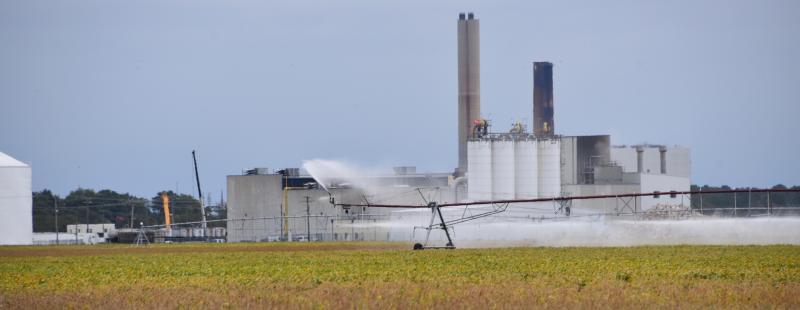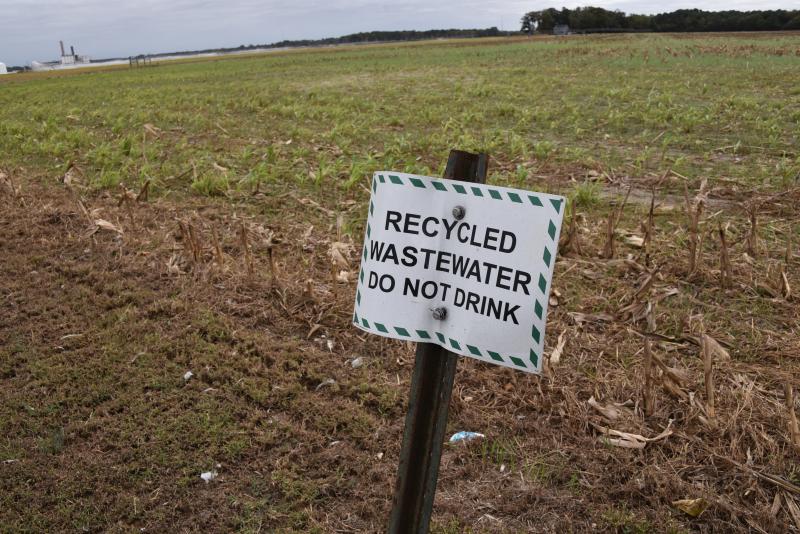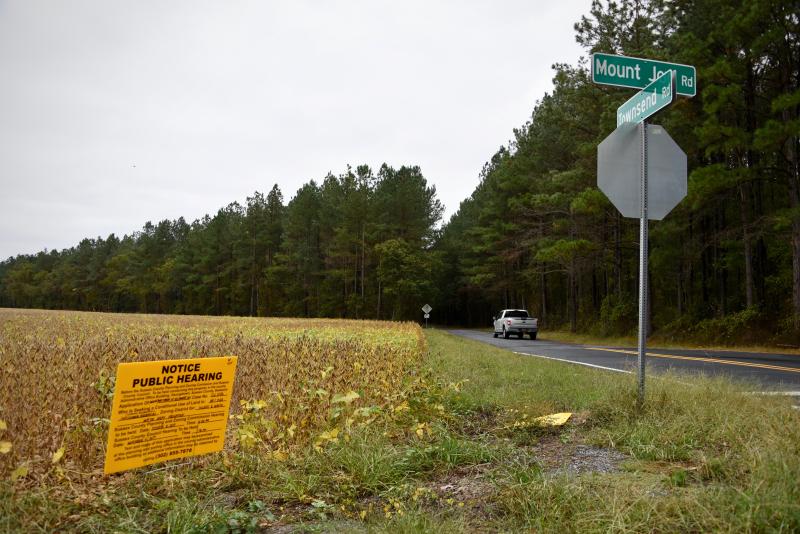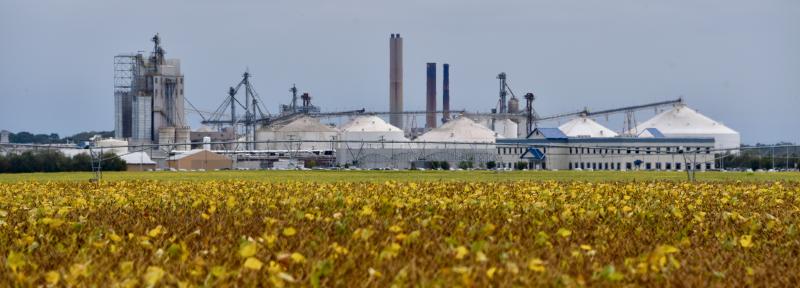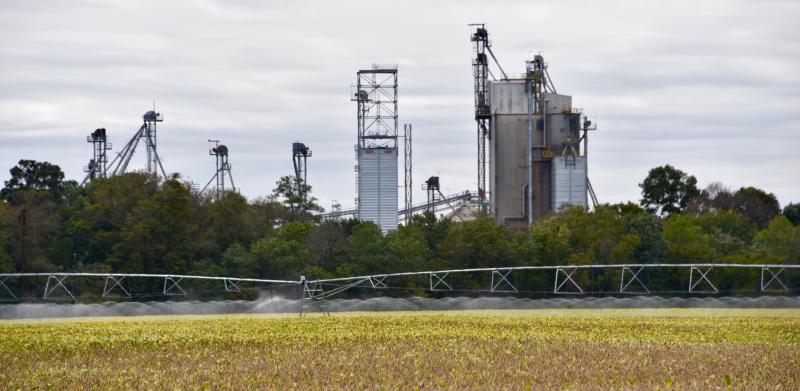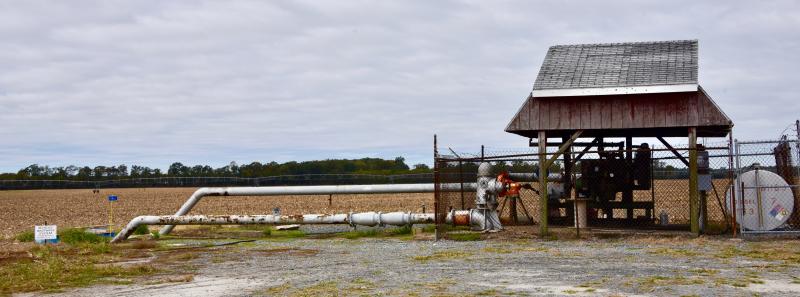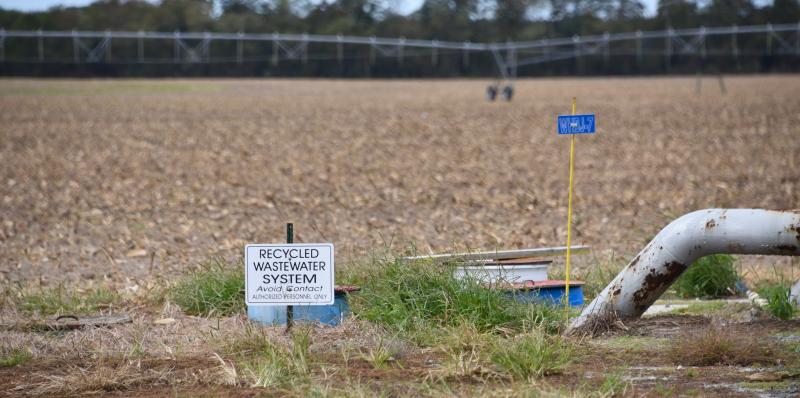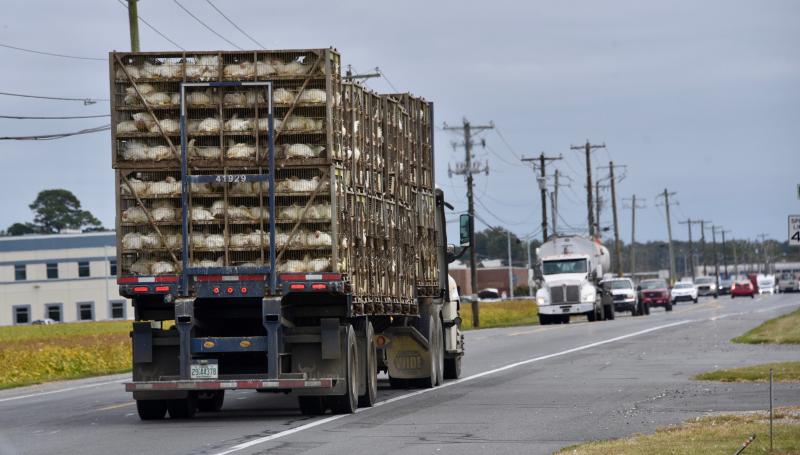During an Oct. 10 Sussex County Planning and Zoning Commission meeting, residents pushed for more information on a conditional-use application filed by Mountaire Farms of Delaware to add more acreage to its existing 920 acres for wastewater disposal.
The poultry company has filed the application with Sussex County to apply sludge and spray wastewater on a new 352-acre parcel on both sides of Mount Joy Road and Townsend Road near its Millsboro plant off Route 24.
Under the Mountaire plan, wastewater would be pumped to the new location via underground pipes from a yet-to-be-built $50 million wastewater treatment plant. The sludge that is currently hauled away would be applied to the new fields using two to three tankers per day to spread the sludge.
Under a 2017 Delaware Department of Natural Resources and Environmental Control permit, the plant is permitted to dispose of 2.6 million gallons of wastewater a day.
Mountaire currently sprays wastewater on 13 farm fields near the plant.
Austin Pajda, Mountaire environmental manager, said there are no plans to increase production at the Millsboro plant. “We want to add more acres to spread the same amount of water to allow for less water per acre on fields,” he said. “We hope you see this as an opportunity to further protect the environment.”
The application is filed as Mountaire is embroiled in several lawsuits, including a class-action lawsuit filed on behalf of nearly 750 area residents. The lawsuits claim nitrates and other chemicals from spray irrigation have contaminated drinking water and caused health issues.
Several residents did not speak at the hearing because of a court-imposed gag order in a pending Superior Court case filed against the company.
Questions from residents
Residents posed several questions that Commission Chairman Bob Wheatley directed to the applicants.
Jymayce Wescott, who lives on Cordrey Road near the fields, said, “Those with a vested interest want to know if their property will be impacted. They hear spray irrigation and sludge, and people don't understand. Not all questions have been answered. We want someone to explain what this means for our area.”
She wanted to know how far the wastewater would travel in the ground. “Will this impact our drinking water?” she asked.
“How will the $50 million plant protect us? If the water will be so clean, I'd like to see someone take a glass and drink it. We need clarity and information. Will our children have to deal with the same issues?” she asked.
Pajda said water infiltration rates and how much sludge can be applied on the ground are predetermined by DNREC. “The depth is also predetermined, so there is no impact on groundwater,” he said.
Tanya Rogers, Mountaire director of environmental compliance, said the new treatment plant at the Millsboro facility will be state-of-the-art. She said DNREC officials can inspect the operation at any time.
She said groundwater would be monitored daily with reports filed monthly, quarterly and annually with DNREC. She said discharge on the fields would include less nitrogen than would normally be applied to fields of corn, soybeans and wheat.
“Are you willing to have lesser yield in order to soak up all the nitrogen?” asked Commissioner Keller Hopkins.
Rogers replied yes and said additional fertilizer would likely not be applied to the fields.
Keith Steck of Milton spent more than a half hour asking questions. “There has been environmental harm to drinking water in that area. Mountaire is in the middle of lawsuits, negotiations and settlements with DNREC,” Steck said.
He said the application does not deserve serious consideration due to its incomplete analysis, and lack of information and documents.
In addition, he said, the county planning and zoning information sheet lists the parcel as 203 acres and not the 352 acres as proposed.
Steck asked what chemicals would be in the sludge, where the wastewater and sludge would be coming from and how it would get to the site, whether the wastewater would be mixed with sanitary sewage from the plant and whether a soil analysis had been done by Sussex Conservation District.
He said there is no documentation on potential environmental impact on the area.
“There are a lot of unanswered questions. You need to study this,” he told the commission.
The applicant's representatives responded that the sludge is monitored by DNREC, and there are no heavy metals used in the plant; sanitary wastewater would be treated along with processing wastewater at the treatment plant and only wastewater and sludge from the Millsboro plant would be sprayed or applied to the fields.
Padja said he could not say exactly where spray and sludge application would occur on the 352 acres. He said DNREC officials would determine spray locations if the application is approved, with soil testing, determination of infiltration rates, and delineation of wetlands and streams. He said additional monitoring wells could be required.
Padja said a minimum 200-foot buffer would be required from homes east of the site.
Shelly Cohen of Milton said disposing of waste on the fields was not an agricultural activity permitted under AR-1, agricultural-residential, zoning. “If it was agriculture, there would be no need for a conditional use. Planning and zoning is well aware of the contamination of drinking water caused by the applicant. This benefits one corporate entity, and potentially harms all residents with wells,” she said.
Joanne Haynes of Millsboro asked how the company was allowed to use spray irrigation during rainy periods. “Years ago, they didn't spray when it was raining,” she said. “Now they spray all the time. My big concern is that it's too much water.”
Rogers said the company has a DNREC permit to spray on wet fields, but runoff is not permitted. “Our operation is monitored 24-7 on the spray-irrigation fields,” she said.
Mountaire Executive Vice President Michael Tirrell said the company is investing $50 million in a new wastewater treatment plant in Millsboro. “The state is pleased with our progress, and we look forward to building it. The plant will be more than what we are required to do,” he said. “We are spending millions of dollars to get in shape, and this application would be a significant part of that progress.”
Assurances from DNREC
Commissioner Kim Hoey Stevenson said she wanted assurances from state environmental officials that the proposal would not pollute residents' drinking water. “I was hoping someone from DNREC was here to tell us they've got this under control. I'd like a letter from DNREC telling us they are watching this,” she said.
Sussex County Planning and Zoning Director Janelle Cornwell suggested the commission make the DNREC permit a condition before approval of the final site plan.
“No doubt this is on DNREC's radar screen,” Wheatley said.
Commissioner Hopkins said the poultry operation in the area was begun by Townsends Inc. before it was sold to Mountaire. “It's the same land they've been using for 100 years,” he said.
Planning and zoning commissioners deferred a vote to a future meeting. Sussex County Council's hearing is scheduled for 1:30 p.m., Tuesday, Nov. 5, in the county administration building, 2 The Circle, Georgetown. The public record is available at the county planning and zoning office in the administration building from 8:30 a.m. to 4:30 p.m. weekdays.
Litigation is pending
In September 2017, Mountaire reported a failure of its wastewater treatment plant, causing Mountaire’s wastewater to exceed the effluent limits of its spray permit. DNREC issued a notice of violation in November 2017 on 17 environmental infractions.
In June 2018, DNREC filed suit against Mountaire to get judicial approval of a consent decree that called for Mountaire to pay a $600,000 penalty and make short- and long-term improvements to the plant and to offer an alternative water supply to nearby residents, either through new wells or through a central water supply company.
Under the decree, Mountaire officials did not accept responsibility for contaminated drinking water, stating that nitrates have existed for decades because of farming in the area. Mountaire purchased the former Townsends Inc. in 2000.
About the time the consent decree was announced, attorneys for Gary and Anne-Marie Cuppels announced they had filed a class-action lawsuit in Delaware Superior Court against Mountaire for health problems brought on by drinking water they say was contaminated by Mountaire. That lawsuit is ongoing. A similar lawsuit was also filed by Joseph and Joan Balback and 45 class members in federal court.
Mountaire employs 3,000 at Millsboro plant
Mountaire Executive Vice President Michael Tirrell said the company employs 3,000 people at the Millsboro plant and 5,000 people throughout Delmarva. He said in 2017, Mountaire, headquartered in Millsboro, paid $100 million in wages, $77 million to its growers, $60 million in utilities and $50 million in capital improvements. In addition, he said, the company continues to invest millions in charitable work.
